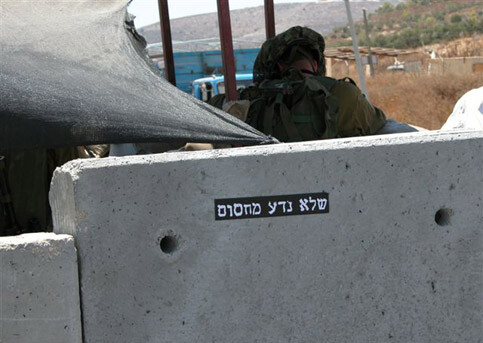Palestine Red Crescent Society 8 May 2005

An Israeli soldier at one of the hundreds of checkpoints in the West Bank. (Markus Cuel)
The Red Crescent deploys mobile teams to provide primary health care to 25,000 vulnerable people affected by movement restrictions in the southern West Bank.
Suheila Al-Hureibat, also known as Um Mohammad, is a 38-year-old mother of seven children, aged from two to 13. Still, she hopes for more. “We want another two, preferably boys,” she laughs, before adding more seriously: “It will be easier for them to make their living.”
Um Mohammad is a resident of Beit Al-Rush, near Hebron. The southern West Bank is considered by many aid agencies as one of the areas with the worst humanitarian situations in Palestine. Before 2000, Um Mohammad’s husband used to earn his living in Israel as a casual worker, like almost nine Palestinian men out of 10 in this region. But when the Intifada began, he was no longer granted a work permit. “The Green Line is less than one kilometre away,” the woman says, pointing her finger at the closest hill.
In Beit Al-Rush as in most of the West Bank and the Gaza Strip, unprecedented levels of unemployment and poverty now prevail. “Everything is expensive, including food and water,” explains Um Mohammad, admitting she has not settled the electricity bill for the past four years. According to United Nations estimates, around half of the population is living below the poverty line of US$ 2.10 per day, compared to just 22 per cent in 2000. And 16 per cent of Palestinians (approximately 560,000 people) are in deep poverty.
Years of restrictions on the movement of people and goods have affected all aspects of everyday life in the Palestinian Territories. A growing number of Palestinians continue to face problems reaching their work places as well as schools and health facilities. Standards of education and health have deteriorated, with serious effects on vulnerable groups such as women and children.
To help mitigate these effects, the Palestine Red Crescent (PRCS) is sending medical teams to areas of acute needs. Funded by the Humanitarian Aid department of the European Commission (ECHO) through the Finnish Red Cross, the project has benefited around 25,000 people since summer 2004 in Beit Al-Rush and 14 other villages of the Hebron region. “Each team is composed of a doctor, a nurse, and a driver. They visit every targeted village once a week,” explains Dr. Abed Rabbo, who coordinates activities in the field. “To address specific needs, we sometimes do home visits as well.”
Today in Beit Al-Rush, consultations started at eight in the morning and will go on until around 14:00 hours. They take place at a public dispensary which the Ministry of Health is trying to maintain, despite a recurrent lack of resources. The centre has just one nurse, and only carries out vaccination campaigns.
“Our team treats up to 35 patients per day here, mostly women and children,” says Dr. Jihad Atal, a PRCS junior physician. “The most frequent problems are respiratory tract and urinary infections, followed by diarrhoea and chronic diseases.” The medical check is free of charge but patients are asked to contribute a symbolic fee of three Shekels for medicines - less than a dollar, 15 times less than their real value.
“In the past, we had to borrow my brother-in-law’s car to reach a private clinic some 25 kilometres away, and the doctor would charge us at least 20 Shekels,” remembers Um Mohammad, as she is prescribed a syrup to calm stomach pains as well as eye drops for her daughter. The pharmacy is made up of two cardboard boxes full of antibiotics, anti-inflammatory drugs and various ointments, as well as a couple of plastic containers with disposable medical items. The mobile team carry these supplies from one village to another.
The closest hospital is in Hebron, about 25 kilometres away. Access is anything but certain, as Israeli soldiers can prevent anyone (including ambulances) from crossing checkpoints both ways without prior notice. For now, the health of Um Mohammad, her family and many other ordinary Palestinians is in the hands of the Red Crescent.
Related Links